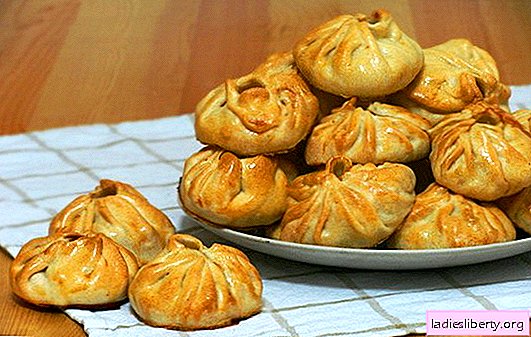
For a long time, doctors tried to determine the cause of female malaise before menstruation. Some believed that the female cycle is associated with the lunar phases, others associated it with the climate.
In ancient Rome, there was a "women's week" - the time before menstruation, when a woman was inviolable. She was forgiven scandals, tantrums, whims and any whims.
She could disobey her husband and do whatever she wished. Stories known case when the wife killed her husband, because he insisted on intimacy in spite of her desire. As it happened shortly before the menstruation, the woman was acquitted, and the annoying spouse was found guilty. It is a pity that we do not have such "female weeks" of permissiveness.
For centuries, the state of a woman before menstruation remained a mystery to physicians. Finally, in the twentieth century, the secret slightly opened up - women began to associate the state of health before menstruation with hormonal changes.
Premenstrual syndrome is an explosive cocktail of 150 mental and physical symptoms.
About 75% of the beautiful half of humanity faces it to varying degrees. Symptoms begin to plague a woman a few days before menstruation (from two to ten) and gradually disappear with the appearance of "red" days.
Interesting facts about premenstrual syndrome

- For the first time the term "PMS" was used by the British gynecologist Robert Frank in 1931.
- The symptoms of premenstrual syndrome are more affected women, whose activities are associated with mental labor and residents of large cities.
- Criminal days. PMS is not only a disgusting mood and moral mockery of a spouse. Most of the thefts, crimes and accidents are committed by women after the 21st day of the menstrual cycle, at the very "peak" of premenstrual syndrome.
- Shopaholia. Studies confirm that a few days before menstruation, girls are much more likely to part with their money and are more susceptible to the temptation of shopping.
Causes of Premenstrual Syndrome

There are many theories about the causes of ailments before menstruation - psychosomatic, allergic, hormonal. The most popular is the hormonal theory. According to this theory, in the second phase of the menstrual cycle, strong fluctuations of sex hormones begin.
To complete the work of the female body is very important balance of sex hormones - progesterone, androgen and estrogen. During the premenstrual syndrome, the hormonal background of the female body undergoes strong changes. Symptoms of PMS appear due to an incorrect reaction of the body to changes in the hormonal background.
The brain regions responsible for emotions and behavior begin to respond inadequately to hormonal changes. This entails a whole wreck of somatic and mental symptoms. Symptoms depend not so much on the level of hormones, but on the reaction of the limbic brain regions to these fluctuations.
What factors aggravate the course of premenstrual syndrome

There are a number of factors that trigger the onset of PMS symptoms:
1. Magnesium deficiency - lack of magnesium can cause dizziness, headache, rapid heartbeat. With a lack of magnesium in the body of a woman strongly pulls to chocolate.
2. Lack of vitamin B6 - leads to fatigue, weakness, swelling, sudden mood swings and chest pain.
3. Smoking - women who smoke are twice as likely to suffer from manifestations of premenstrual syndrome.
4. Overweight - women with a body mass index greater than 30 are three times more likely to suffer from PMS symptoms.
5. Low levels of serotonin - lack of the "hormone of joy" causes sadness, longing, tearfulness and depressive mood.
6. Heredity - girls whose mothers suffered from premenstrual syndrome are at risk of inheriting it.
7. Difficult childbirth, abortion, gynecological diseases and stress often lead to the appearance of PMS.
Symptoms of premenstrual syndrome

Premenstrual syndrome is very rich in completely different, not similar to each other symptoms. All these symptoms can be divided into several groups:
- neuropsychiatric - the most common group of symptoms. In this period, women often change their mood - the desire to cry is replaced by the desire to blow up the whole world. Many girls become irritable, nervous, anxious. Appears apathy, sadness, longing. Some suffer from insomnia and depressed mood.
- vegetovascular - headache, dizziness, pressure jumps, pain in the heart, nausea, vomiting, heart palpitations, malfunctions of the gastrointestinal tract.
- endocrine - fever, swelling, frequent urination, thirst, belching, abdominal distension, chest pain, skin itching, acne, feeling of lack of air, reduced attention and memory.
Some women may experience a slight weight gain. This is due to fluid retention in the body. Sometimes the symptoms of PMS can manifest themselves in the form of crises and seizures - a woman is worried about attacks with high blood pressure, frequent urination, dizziness, pain in the heart area and a feeling of strong anxiety and fear, that is, with typical signs of a panic attack.
When to see a doctor

Of course, if the symptoms of premenstrual syndrome deliver only a little discomfort, you can manage on your own. But when PMS violates the quality of life and affects the ability to work, it is impossible to go without a gynecologist. After the examination, the doctor will prescribe the necessary drug therapy and give recommendations.
Depending on the symptoms, PMS is prescribed for:
- homeopathic medicines to relieve the syndrome;
- nonsteroidal anti-inflammatory drugs - for pain in the back and abdomen, headaches;
- antidepressants and tranquilizers - with pronounced mental disorders;
- diuretics - for edema;
- hormonal therapy - in violation of the balance of sex hormones.
How to ease PMS

There are a few simple recommendations that will significantly improve the quality of your life before menstruation.
1. Healthy and full sleep. Try to sleep at least 9-10 hours a day. During this time, your body will have time to recuperate and fully relax. Lack of sleep will only increase anxiety, aggression and adversely affect immunity. If you have trouble falling asleep, try light walks at bedtime, relaxing baths and always ventilate the bedroom.
2. Therapeutic baths. If you are not allergic to essential oils, make up your aromatic composition. Special aromatic oils - quite effective weapon in the fight against premenstrual syndrome. Sage, geranium and rose oil helps to normalize the cycle. Basil and lavender effectively cope with muscle spasms, they will help to overcome the pain in the abdomen and lower back, headache and aching muscles. Bergamot and juniper improve mood, help to cope with melancholy, sadness, irritability and depressive mood. To achieve a good result, start taking baths with aromatic compositions two weeks before your period.
3. Exercise. Running, yoga, walking, dancing, pilates - effectively cope with the manifestations of premenstrual syndrome in women of different ages. Physical activity increases the level of the “happiness hormone” and helps to cope with the mental symptoms of PMS. If you exercise regularly, you will forget about insomnia and depression, and your periods will be less painful.
4. Vitamins. Two weeks before menstruation, start taking vitamins E, A, B6 and magnesium. This will relieve you from fatigue, insomnia, irritability, anxiety, pain in the heart, tachycardia and blood pressure surges.
5. Diet. In the second phase of the menstrual cycle, try to eat more vegetables, fruits and foods rich in fiber and calcium. But from coffee, cola and chocolate should be temporarily abandoned. If you are tormented by anxiety, apathy, bad mood, irritability - caffeine will only aggravate the problem. Ideally, the daily diet should look like this: 75% carbohydrates, 15% protein and 10% fat. From fatty, salty and spicy foods should be abandoned. Eat spinach daily - just one cup of spinach added to a salad or smoothie will enrich your body with the daily intake of magnesium. And turkey will help increase serotonin levels - the meat of this bird is very rich in vitamin B6, which will ease breast soreness and irritability.
6. Healthy drinks. Coffee is better to replace herbal teas and freshly squeezed juices. Apple and carrot juices are especially useful during this period. Alcohol will have to be abandoned, as it depletes the reserves of B vitamins and disrupts carbohydrate metabolism.
7. Relaxation. To avoid stress, relax and maintain a positive attitude will help yoga, relaxation to the calm music or the sounds of nature.
8. Sex It is no secret that before menstruation, many women are awakened by a brutal sexual appetite. Do not go against your desire - nature gives a hint how to cope with PMS manifestations. Regular lovemaking helps overcome bad temper, irritability, tearfulness, anxiety and insomnia. Orgasm is the best antidepressant - it instantly increases the level of serotonin. It's time to enjoy sexual games with your partner and try something new.
The best drugs for premenstrual syndrome are a healthy diet, physical activity, vitamin supplements, good sleep and regular sex with a loved one.











